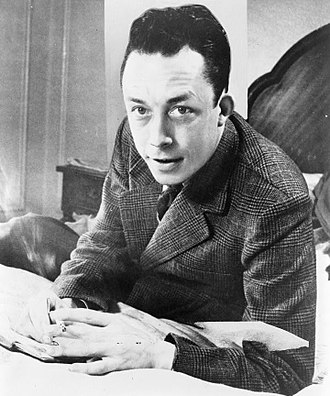Albert Camus

Albert Camus (/kæˈmuː/ kam-OO, US also /kəˈmuː/ kə-MOO; French: [albɛʁ kamy] (About this soundlisten); 7 November 1913 – 4 January 1960) was a French philosopher, author, and journalist. He was awarded the 1957 Nobel Prize in Literature at the age of 44, the second-youngest recipient in history. His works include The Stranger, The Plague, The Myth of Sisyphus, The Fall, and The Rebel.
Camus was born in French Algeria to Pieds Noirs parents. He spent his childhood in a poor neighborhood and later studied philosophy at the University of Algiers. He was in Paris when the Germans invaded France during World War II in 1940. Camus tried to flee but finally joined the French Resistance where he served as editor-in-chief at Combat, an outlawed newspaper. After the war, he was a celebrity figure and gave many lectures around the world. He married twice but had many extramarital affairs. Camus was politically active; he was part of the left that opposed the Soviet Union because of its totalitarianism. Camus was a moralist and leaned towards anarcho-syndicalism. He was part of many organisations seeking European integration. During the Algerian War (1954–1962), he kept a neutral stance, advocating for a multicultural and pluralistic Algeria, a position that caused controversy and was rejected by most parties.
Philosophically, Camus’s views contributed to the rise of the philosophy known as absurdism, a movement reacting against the rise of nihilism. He is also considered to be an existentialist, even though he firmly rejected the term throughout his lifetime.
Albert Camus was born on 7 November 1913 in a working-class neighbourhood in Mondovi (present-day Dréan), in French Algeria. His mother, Catherine Hélène Camus (née Sintès), was French with Spanish-Balearic ancestry. His father, Lucien Camus, a poor French agricultural worker, died in the Battle of the Marne in 1914 during World War I. Camus never knew him. Camus, his mother and other relatives lived without many basic material possessions during his childhood in the Belcourt section of Algiers. He was a second-generation French in Algeria, a French territory from 1830 until 1962. His paternal grandfather, along with many others of his generation, had moved to Algeria for a better life during the first decades of the 19th century. Hence, he was called pied-noir, ”black foot”—a slang term for French who were born in Algeria—and his identity and his poor background had a substantial effect on his later life.[2] Nevertheless, Camus was a French citizen, in contrast to the Arab or Berber inhabitants of Algeria who were kept under an inferior legal status.[3] During his childhood, Camus developed a love for football and swimming.[4]
Under the influence of his teacher Louis Germain, Camus gained a scholarship in 1924 to continue his studies at a prestigious lyceum (secondary school) near Algiers.[5] In 1930, he was diagnosed with tuberculosis.[4] Because it is a transmitted disease, he moved out of his home and stayed with his uncle Gustave Acault, a butcher, who influenced the young Camus. It was at that time that Camus turned to philosophy, with the mentoring of his philosophy teacher Jean Grenier. He was impressed by ancient Greek philosophers and Friedrich Nietzsche.[4] During that time, he was only able to study part-time. To earn money, he took odd jobs: as a private tutor, car parts clerk, and assistant at the Meteorological Institute.[6]
